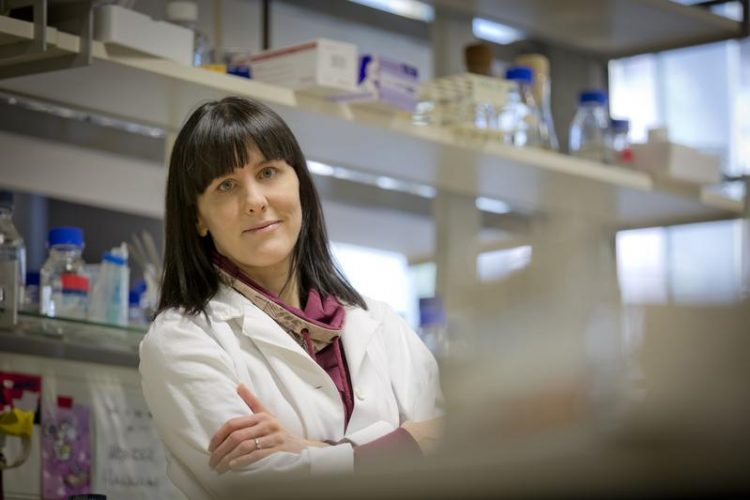Complex pathogens: Effects of gastric bacterium Helicobacter pylori on other organs revealed

Sabine Kienesberger-Feist Photo: Uni Graz/Lunghammer
Some two kilogrammes of bacteria live on and in our body. It is not always easy to distinguish between “good” and “bad” bacteria because their complex interactions have barely been explored. This is also true for Helicobacter pylori. “We do know, for example, that in societies where the prevalence of Helicobacter is high, children suffer less frequently from asthma”, says Dr. Sabine Kienesberger of the Institute of Molecular Biosciences at the University of Graz, lead author of the paper in Cell Reports.
The scientists discovered various interesting relationships: “Our investigations have shown that a Helicobacter infection leads to an accumulation of specific T-cells in the lungs. These cells play an important role in our immune system”, Kienesberger says.
The team was particularly surprised to see that a Heliobacter infection also entails changes in the composition of the intestinal flora which can, in turn, stimulate the immune system. The researchers also found shifts in hormonal balance. “The concentration of the ‘hunger hormone’ ghrelin, for example, increased. Excessive production of this hormone stimulates the appetite. Ghrelin is also known to have an impact on the immune system”, Kienesberger adds.
What makes this study so special is the long-term observation of the Helicobacter infection and its effects in the mouse model as a dynamic process over an extended period. Kienesberger: “The early and to some extent contradictory effects on the lungs came as a surprise, even though an increased immune reaction in the stomach was noted only later.” The study provides a sound basis for further research and targeted investigation of the complex interactions of Helicobacter, microbiome and the immune system.
Kienesberger cooperated with colleagues from the University of Graz, the Medical University of Graz, and from New York University School of Medicine for this publication. She carried out the major part of her investigations during her 30-month postdoc programme in New York where she worked in the team of Prof. Dr. Martin Blaser, a pioneer in microbiome research. At the University of Graz she is a member of Univ.-Prof. Dr. Ellen Zechner’s working group. The study was undertaken in the framework of BioTechMed-Graz, the joint research initiative of the University of Graz, the Medical University of Graz and Graz University of Technology.
Publication:
Gastric Helicobacter pylori Infection Affects Local and Distant Microbial Populations and Host Responses
Sabine Kienesberger, Laura M. Cox, Alexandra Livanos, Xue-Song Zhang, Jennifer Chung, Guillermo I. Perez-Perez, Gregor Gorkiewicz, Ellen L. Zechner, and Martin J. Blaser
Cell Reports, February 16, 2016
Contact:
Dr. Sabine Kienesberger-Feist
Institute of Molecular Biosciences at the University of Graz, Austria
Phone: +43 (0)316/380-5505
E-mail: sabine.kienesberger@uni-graz.at
Media Contact
More Information:
http://www.uni-graz.atAll latest news from the category: Life Sciences and Chemistry
Articles and reports from the Life Sciences and chemistry area deal with applied and basic research into modern biology, chemistry and human medicine.
Valuable information can be found on a range of life sciences fields including bacteriology, biochemistry, bionics, bioinformatics, biophysics, biotechnology, genetics, geobotany, human biology, marine biology, microbiology, molecular biology, cellular biology, zoology, bioinorganic chemistry, microchemistry and environmental chemistry.
Newest articles

Innovative vortex beam technology
…unleashes ultra-secure, high-capacity data transmission. Scientists have developed a breakthrough optical technology that could dramatically enhance the capacity and security of data transmission (Fig. 1). By utilizing a new type…

Tiny dancers: Scientists synchronise bacterial motion
Researchers at TU Delft have discovered that E. coli bacteria can synchronise their movements, creating order in seemingly random biological systems. By trapping individual bacteria in micro-engineered circular cavities and…

Primary investigation on ram-rotor detonation engine
Detonation is a supersonic combustion wave, characterized by a shock wave driven by the energy release from closely coupled chemical reactions. It is a typical form of pressure gain combustion,…



